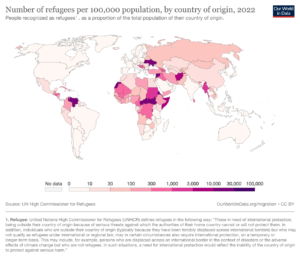The plight of refugees in our world is desperate. It always has been, but the numbers are staggering today. Focusing on this matter is not a political issue (although we would hope that the answers to the question might influence our politicians). Rather, we are asking how God feels about the vulnerable, and what our response could be. For example, consider Deut 10:18-19: "He defends the cause of the fatherless and the widow, and loves the foreigner residing among you, giving them food and clothing. And you are to love those who are foreigners, for you yourselves were foreigners in Egypt."
We ourselves did not belong in God’s kingdom. Our present citizenship is only because of his great mercy and compassion: “… Remember that at that time you were separate from Christ, excluded from citizenship in Israel and foreigners to the covenants of the promise, without hope and without God in the world… Consequently, you are no longer foreigners and strangers, but fellow citizens with God’s people and also members of his household” (Ephesians 2:12). Other relevant Scriptures include: Matthew 25:35-36; Leviticus 19:33–34; Hebrews 13:1–2; Isaiah 58:6–7; Luke 10: 25–37.
Talking about a topic like this can be overwhelming. It can be hard to find the personal relevance. Here are a few suggestions:
- Biblical References: Examine passages in the Bible that relate to refugees, migrants, and foreigners. Read New Testament teachings on love, compassion, and helping others in need.
- Context & Historical Background: Explore the historical and cultural context of biblical times regarding migration, refugees, and hospitality. This can provide insights into how Jesus and other biblical figures interacted with strangers and foreigners.
- Jesus' Teachings: Study Jesus' teachings on love, compassion, and caring for the marginalised. Explore parables and stories that illustrate these principles, such as the Parable of the Good Samaritan (Luke 10:25-37).
- Church History: Research how the early Christian church and subsequent church history have addressed issues related to refugees and migrants. Consider examples of outstanding people who advocated for the rights and well-being of displaced people.
- Contemporary Relevance: Connect biblical teachings to contemporary issues related to refugees and immigration. Explore the challenges faced by refugees today, the role of hospitality, and how Christians can respond to these challenges in a compassionate and Christ-like manner.
- Practical Application: Develop practical ways in which you and we as a faith community can follow Jesus' example in welcoming refugees. This may include supporting refugee resettlement programs, volunteering, and advocating for just immigration policies.
- Personal Reflection: Reflect on your own faith and how it informs your view on this issue. Share personal stories or anecdotes that relate to the theme of the sermon. Following this link will take you to some more suggestions.
Listen to the talk HERE (video podcast) and also HERE (sermon).









